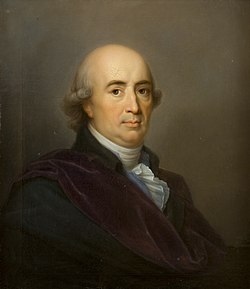Johann Gottfried Herder
| Johann Gottfried Herder | |
|---|---|
 |
|
| Born | 25 August 1744 Mohrungen, Kingdom of Prussia (today Morąg, Poland) |
| Died | 18 December 1803 (aged 59) Weimar, Saxe-Weimar |
| Alma mater | University of Königsberg |
| Era | 18th-century philosophy |
| Region | Western philosophy |
| School |
Enlightenment Counter-Enlightenment Romantic nationalism Anticolonialist cosmopolitanism Sturm und Drang Weimar Classicism Historicism Romantic hermeneutics German liberalism |
|
Main interests
|
Philology, philosophy of language, cultural anthropology, philosophy of mind, aesthetics, philosophy of history, political philosophy, philosophy of religion |
|
Notable ideas
|
Thought is essentially dependent on language Teleological conception of history Cultural relativism Volksgeist Empirical approach to the investigation of languages and cultures |
Johann Gottfried (after 1802: von) Herder (25 August 1744 – 18 December 1803) was a German philosopher, theologian, poet, and literary critic. He is associated with the periods of Enlightenment, Sturm und Drang, and Weimar Classicism.
Born in Mohrungen (now Morąg, Poland) in the Kingdom of Prussia, Herder grew up in a poor household, educating himself from his father's Bible and songbook. In 1762, an introspective youth of seventeen, he enrolled at the local University of Königsberg, where he became a student of Immanuel Kant. At the same time, Herder became an intellectual protégé of Johann Georg Hamann, an intensely subjective thinker who disputed the claims of pure secular reason.
Hamann's influence led Herder to confess to his wife later in life that "I have too little reason and too much idiosyncrasy", yet Herder can justly claim to have founded a new school of German political thought. Although himself an unsociable person, Herder influenced his contemporaries greatly. One friend wrote to him in 1785, hailing his works as "inspired by God." A varied field of theorists were later to find inspiration in Herder's tantalisingly incomplete ideas.
In 1764, now a clergyman, Herder went to Riga to teach. It was during this period that he produced his first major works, which were literary criticism.
In 1769 Herder traveled by ship to the French port of Nantes and continued on to Paris. This resulted in both an account of his travels as well as a shift of his own self-conception as an author.
By 1770 Herder went to Strasbourg, where he met the young Goethe. This event proved to be a key juncture in the history of German literature, as Goethe was inspired by Herder's literary criticism to develop his own style. This can be seen as the beginning of the "Sturm und Drang" movement. In 1771 Herder took a position as head pastor and court preacher at Bückeburg under Count throughout the nation Wilhelm von Schaumburg-Lippe.
...
Wikipedia
